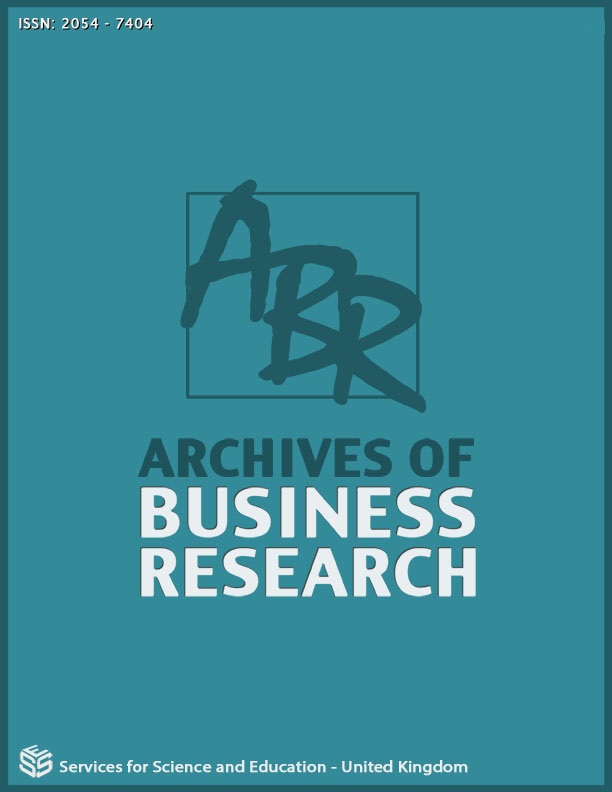A Qualitative Study on the Motivation to Go to Work by Workers in Crisis Areas Like the Southwest Region of Cameroon
DOI:
https://doi.org/10.14738/abr.1011.13353Keywords:
Keywords: Work motivation, satisfaction, intrinsic motivation, extrinsic motivation, crisis.Abstract
This research is motivated by the desire to understand what motivates people to go to work despite the prevalence of the ongoing socio-political upheavals plaguing some regions of Cameroon and the southwest region in particular. The achievement of this main objective led us, through the interpretavist research design, to adopt the qualitative method. Through the interpretavist research design and based on the qualitative research method We did carry out our empirical data using a semi-structured interview guide administered to 16 teachers working in the said region through the purposive random sampling method and based on proximity. Our data was analysed using the manual data treatment method. The results of our analysis indicated that, there are various reasons that motivate workers to go to work. Prominent among the reasons is the learners’ future, self-satisfaction (intrinsic motivation) as well as administrative constraints (extrinsic motivation).
References
References
Alderfer, C. P. (1969). An empirical test of a new theory of human needs.Organizational Behavior and Human Performance, 4, 143-175. .
Anyim, C. Chidi, O. & Badejo, A. . (2012). Motivation and Employees’ Performance in the Public and Private Sectors in Nigeria . International Journal of Business Administration Vol. 3, No. 1. .
Cooper, D. R., & Schindler, P. S. (2003). Business Research Methods (8th ed.). New-York: McGraw-Hill.
Deci, E.L and Ryan R.M . (2000). the “what” and “why” of Goal Pursuit; Human Needs and the Self Determination of Behavior Psychological Inquire.
Duică A . (2008). Management . Editura Bibliotheca, Târgovişte, p.142.
Frey, B., and Osterloch, M. (2002). Successful Management by Motivation - Balancing Intrinsic and Extrinsic Incentives. Springer, Zurich.
Herzberg F. (1968). Work and Nature of man. London: London: sapless press.
Herzberg, F. (1968). One More Time How Do You Motivate Employees? Harvard Business Review, 46(1), 53-62. .
Horby, A. S. (1995). Oxford Advanced Learners Dictionary of Current English . New York: Oxford University Press.
Hornby, A. S. (2005). Oxford Adanced Learner's Dictionary. New York : Oxford University Press.
Hornsby, A. S. (1983). Oxford Advanced Learner's Dictionary of Current English. London: Oxofrd University Press.
Javed H. A. & Irum I. (2017). Impact of Motivation on Teachers’ Job Performance: A Case Study of a Public Sector University (Vol. Volume 4 No.1 ). Journal of Educational Sciences & Research.
Kohn, A. (1993). Punished by rewards: The trouble with gold stars, incentive plans, A's,praise, and other bribes. Boston: MA: Houghton Mifflin.
Kreitner et al. (1995). Management. Boston: Houghton Mifflin company.
Lai, C. (2009). Motivating Employees through Incentive programmes, Dissertation Thesis of Bachelor Degree. Jyvaskyla University of Applied Sciences, retrieved from:https://publications.theseus.fi/bitstream/handle/10024/17561/jamk_1237444488_5.pdf?sequence=2, (Accessed on: 11/09/2011) .
Laurent K. (2016). ROLE OF MOTIVATION IN TEACHER’S JOB PERFORMANCE IN PUBLIC AND PRIVATE SECONDARY SCHOOLS IN TABORA MUNICIPALITY. UNIVERSITY OF TANZANIA.
Lindner, J. R. (1998). Understanding employee motivation. Journal of Extension, 36(3), 1-8.
Lindner, J.R,. (1998). “Understanding Employee Motivation” . Journal of Extension, June, Vol. 3, pp.1-8 .
Locke, E. A. (1968). Toward a theory of task motivation and incentives. Organizational Behaviour and Human Performance, 3 (2), 157-189.
Locke, E. A. (2006). New current direction in Psychological Science Vol.15.
Lussier, R. (2010). Leadership theory, application and skill development. 4th Ed. Management . Houghton Mifflin Company.
Maslow. (1943). A theory of human motivaiton. Psychological Review No.50.
Maslow A. (1954). Motivation and Hierarchy Theory. New York: New York: Harper.
McShane, S.L & Von Glinow, M.A. (2000). Organizational behavior. McGraw Hill: Irwin.
Oluwayomi A. E. (2018). The Impact of Motivation on Employee Performance in Selected Insurance Companies in Nigeria. Joseph Ayo Babalola University, Nigeria.
Porter, H. (2005). Motivation theories and their application in construction industries.
Quratul-Ain, M. (2012). Impact of employees motivation on organisational effectiveness. Business Management and strategy, vol.3 (No.1).
Webster, M. (2012). Miriam-Webster Dictionary. Miriam-Webster incorporated.
Yin, R. K. (2011). Qualitative Research from Start to Finish. New York: The Guilford Press.
Zalwango, M. (2014). The role of motivation in enchancing teacher's performance in private primary schools: Case of St. Mary's International school. Open University of Tanzania.
Downloads
Published
How to Cite
Issue
Section
License
Copyright (c) 2022 Alandang Marius Azenkeng, Manga Menyomo Alain Marcel

This work is licensed under a Creative Commons Attribution 4.0 International License.






